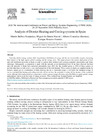Identificador persistente para citar o vincular este elemento:
https://accedacris.ulpgc.es/jspui/handle/10553/105893
| Campo DC | Valor | idioma |
|---|---|---|
| dc.contributor.author | Balboa-Fernández, Martín | en_US |
| dc.contributor.author | de Simón-Martín, Miguel | en_US |
| dc.contributor.author | González-Martínez, Alberto | en_US |
| dc.contributor.author | Rosales Asensio, Enrique | en_US |
| dc.date.accessioned | 2021-03-18T11:29:00Z | - |
| dc.date.available | 2021-03-18T11:29:00Z | - |
| dc.date.issued | 2020 | en_US |
| dc.identifier.issn | 2352-4847 | en_US |
| dc.identifier.uri | https://accedacris.ulpgc.es/handle/10553/105893 | - |
| dc.description.abstract | Currently, district energy systems allow long-distance distribution of energy and the use of renewable energies, increasing their interest in the fight against global warming and the energy crisis. This paper presents the current deployment of heat and cold distribution networks in Spain in order to analyze their technical and economic potential, opportunities and future challenges. Subsequently, a comparison is made with the networks at an international level. It has been observed that heat and cold networks in Spain have increased substantially since 2013, but the installed power in 2019 of these systems to provide either heat or cold covers a very small proportion of the total demand. These systems in Spain are supplied mainly by biomass, natural gas or a combination of them, however, the use of renewable energy is still below the European average. It can be concluded that heating and cooling networks still do not have the potential to replace all the demand of the residential sector, although their implementation is important to achieve greater energy efficiency, more flexibility in supply, greater energy independence and to avoid the waste of energy resources. Thus, technical and financial barriers are identified. | en_US |
| dc.language | eng | en_US |
| dc.relation.ispartof | Energy Reports | en_US |
| dc.source | Energy Reports [2352-4847], n. 6, s. 9, p. 532-537 | en_US |
| dc.subject | 332205 Fuentes no convencionales de energía | en_US |
| dc.subject | 330609 Transmisión y distribución | en_US |
| dc.subject.other | District heating and cooling | en_US |
| dc.subject.other | District energy | en_US |
| dc.subject.other | Energy technologies | en_US |
| dc.subject.other | Renewable energy | en_US |
| dc.title | Analysis of District Heating and Cooling systems in Spain | en_US |
| dc.type | info:eu-repo/semantics/conferenceObject | en_US |
| dc.type | conferenceObject | en_US |
| dc.relation.conference | 7th International Conference on Power and Energy Systems Engineering (CPESE 2020) | en_US |
| dc.identifier.doi | 10.1016/j.egyr.2020.11.202 | en_US |
| dc.description.lastpage | 537 | en_US |
| dc.description.firstpage | 532 | en_US |
| dc.investigacion | Ingeniería y Arquitectura | en_US |
| dc.type2 | Actas de congresos | en_US |
| dc.description.numberofpages | 6 | en_US |
| dc.utils.revision | Sí | en_US |
| dc.identifier.ulpgc | No | en_US |
| dc.contributor.buulpgc | BU-ING | en_US |
| dc.description.sjr | 1,199 | |
| dc.description.jcr | 6,87 | |
| dc.description.sjrq | Q1 | |
| dc.description.jcrq | Q1 | |
| dc.description.scie | SCIE | |
| item.fulltext | Con texto completo | - |
| item.grantfulltext | open | - |
| crisitem.author.dept | GIR Group for the Research on Renewable Energy Systems | - |
| crisitem.author.dept | Departamento de Ingeniería Eléctrica | - |
| crisitem.author.orcid | 0000-0003-4112-5259 | - |
| crisitem.author.parentorg | Departamento de Ingeniería Mecánica | - |
| crisitem.author.fullName | Rosales Asensio, Enrique | - |
| crisitem.event.eventsstartdate | 26-09-2020 | - |
| crisitem.event.eventsenddate | 29-09-2020 | - |
| Colección: | Actas de congresos | |
Citas de WEB OF SCIENCETM
Citations
11
actualizado el 08-jun-2025
Visitas 5
288
actualizado el 27-sep-2025
Descargas
308
actualizado el 27-sep-2025
Google ScholarTM
Verifica
Altmetric
Comparte
Exporta metadatos
Los elementos en ULPGC accedaCRIS están protegidos por derechos de autor con todos los derechos reservados, a menos que se indique lo contrario.
